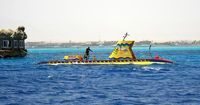On March 27, 2025, a tragic incident occurred in the Red Sea off the resort city of Hurghada, Egypt, when a tourist submarine sank, resulting in the deaths of at least six individuals. The submarine was reportedly carrying 44 passengers, all of whom were Russian tourists, according to Viktor Woropajew, the Russian General Consul in Hurghada. In addition to the fatalities, nine others sustained injuries, with four in critical condition.
The submarine had embarked on a journey to explore the underwater world, diving to depths of approximately 25 meters to view the vibrant coral reefs. Eyewitness accounts indicate that the vessel collided with a coral reef, leading to panic onboard as water began to flood the submarine. Passengers frantically attempted to save their children as the situation escalated, resulting in chaos.
Rescue operations were swift, involving 21 ambulances and other tourist vessels that assisted in pulling survivors from the water. A total of 29 individuals were rescued unharmed, while the deceased included two minors, as confirmed by Woropajew to the state-run Russian news agency Tass. Eyewitnesses described the scene as devastating, with one individual recalling, "We didn’t know what was happening at first. Then boats began bringing back the first lifeless bodies. They tried to revive them, but we quickly realized there was nothing more to be done."
This incident marks the second deadly maritime disaster in the Red Sea within just a few months. In November 2024, another tourist boat, the motor yacht "Sea Story," sank with over 40 people onboard, leading to six confirmed deaths and five individuals still missing, including two Germans. Such incidents raise concerns about the safety of tourist excursions in the region, which is a popular destination for travelers, especially from Russia and Germany.
Despite stringent safety regulations governing tourist submarine operations, accidents still occur. The operator of the ill-fated submarine, "Sindbad Submarines," claims to own two of the 14 tourist submarines worldwide, which are designed to withstand underwater pressures up to 75 meters. While the submarines can dive to 25 meters, the recent tragedy emphasizes the need for rigorous safety measures to protect passengers.
Egypt has become a favored destination for tourists, particularly during the Easter holidays. According to Tui, a leading travel operator, Egypt ranks as the third most popular travel spot, attracting 13 percent of vacationers during this period. The allure of the Red Sea, with its rich marine life and stunning coral reefs, continues to draw visitors, making incidents like this particularly alarming.
Hurghada, known for its beautiful beaches and vibrant underwater ecosystems, has long been a top choice for tourists seeking to explore the wonders of the Red Sea. The region's accessibility, with direct flights from various Russian cities, has further bolstered its popularity among Russian travelers, especially following the travel restrictions imposed due to the ongoing conflict in Ukraine.
As the investigation into the cause of the submarine sinking continues, the Egyptian authorities have yet to release a detailed report on the incident. Eyewitness accounts suggest that the submarine may have struck a coral reef, leading to the rapid influx of water that caused the vessel to sink. The panic that ensued has been described as chaotic, with parents desperately trying to save their children amidst the turmoil.
This incident raises significant questions about the safety protocols in place for tourist submarines, especially in light of previous maritime disasters. In 2023, the submersible "Titan" tragically imploded during a dive to the wreck of the Titanic, highlighting the potential dangers associated with underwater excursions. Such incidents serve as reminders of the inherent risks involved in adventure tourism.
As the world mourns the loss of life in this latest tragedy, it is crucial for authorities and tour operators to reassess safety measures and ensure that all possible precautions are taken to prevent future accidents. The safety of tourists should remain a top priority to preserve the integrity of Egypt's tourism industry and protect those who seek to experience the beauty of its underwater landscapes.
In summary, the sinking of the tourist submarine near Hurghada has not only claimed lives but has also cast a shadow over Egypt's reputation as a safe tourist destination. With ongoing investigations and calls for improved safety regulations, the hope is that such tragedies can be avoided in the future, allowing travelers to enjoy the wonders of the Red Sea without fear.



